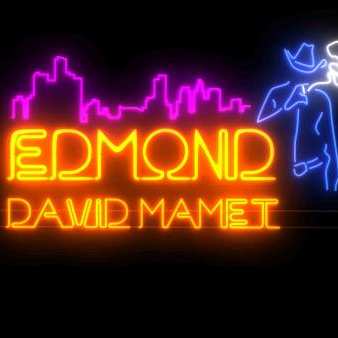
Overview
Synopsis
Mamet's one-act focuses on a New York businessman's descent from a respectable white-collar worker to a murderer in prison. After a visit to a fortune teller, Edmond decides to leave his wife and embarks on an odyssey through New York's seedy underbelly, which takes him to two bars, a bordello, and a peep show. When he accuses a three-card monte dealer of running a crooked game, the dealer and his shills beat Edmond to the ground. Increasingly convinced of the ugliness and difficulty of human existence, Edmond buys a knife from a pawnshop. He threatens a woman on a subway platform, then beats an African-American pimp who is trying to rob him, while calling him racial epitaphs. Invigorated by the act of violence, he goes to a coffehouse and propositions his waitress, Glenna. At her apartment, he tells her how alive beating the pimp has made him feel in a highly racialized speech. Glenna compares the feeling to the one she gets when she is acting. Edmond disputes that she is not a real actress, because she only takes acting classes and does not actually perform for a paying audience. Edmond encourages her to be honest with herself, and to say that she is not an actress, but a waitress. Glenna begins to find his odd behavior disturbing and asks him to leave. An argument escalates, and Edmond kills her with the knife he has bought. Later, after he has left, he hears a preacher at a mission preach that all souls can be redeemed through faith. Edmond wants to go testify to the preacher, but he is identified by the woman from the subway, and arrested. He has a short reunion with his wife, who serves him with divorce papers. In prison, an African-American cellmate is assigned to him. Edmond, at first, expresses conciliatory feelings to his cellmate and blacks in general, saying that people subconsciously desire what they fear and so whites should not try to avoid blacks. His uninterested cellmate sodomizes him. In the penultimate scene, Edmond appears to forgive him, and in the final scene, the two ruminate on the uncertainty of life and the role of destiny in human affairs.
Show Information
- Book
- David Mamet
- Category
- Play
- Age Guidance
- Thirteen Plus (PG-13)
- Number of Acts
- 1
- First Produced
- 1982
- Genres
- Drama
- Time & Place
- new york
- Licensor
- Samuel French
- Ideal For
- All-Male Cast, All-Female Cast, Small Cast
Context
Plot
Characters
| Name | Part Size | Gender | Vocal Part |
|---|
Songs
A song with an asterisk (*) before the title indicates a dance number; a character listed in a song with an asterisk (*) by the character's name indicates that the character exclusively serves as a dancer in this song, which is sung by other characters.
Monologues
Scenes
Key Terms
Sorry! We do not currently have terms for this guide.
Videos
Quizzes
Sorry! We do not currently have quizzes for this guide.
Themes, Symbols & Motifs
Sorry! We do not currently have learning modules for this guide.
Quote Analysis
Sorry! We do not currently have learning modules for this guide.